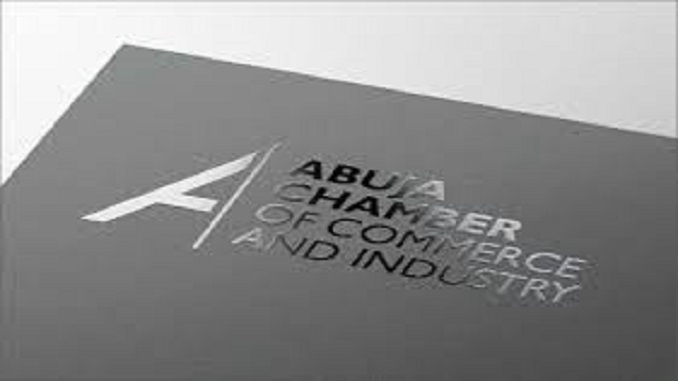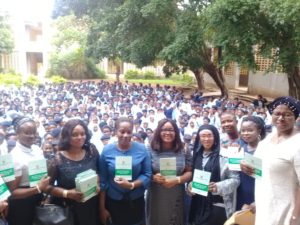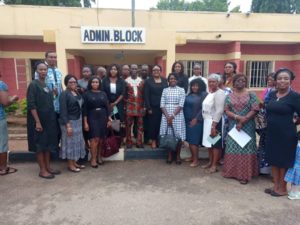By Justice Usman Bukar Bwala
The oldest professions in the world are agriculture and prostitution. An old and related crime to prostitution is rape. Rape is an old crime which existed since the fall of Adam and Eve in the garden of Eden. One of the earliest recorded cases of rape was when Shechem raped Dinah recorded in the book of Genesis 34:2 (NIV). Since then, the crime of rape has blossomed and flourished throughout human existence on earth.
Today, rape is so prevalent in our society that no country, race or religion has been able to check it. The crime of rape exists in the most advanced to the modest primitive society. It exists under any form of government in democratic society, America has one of the highest rate of rape, monarchy like Morocco or Islamic State of Iran. India which has Hindu as its main religion to south Africa, Christian dominated country, rape is prevalent.
Before the advent of modern society, the definition of rape differed from one society to the other so also the punishment for rape. With the advent of modern society, rape has been codified into written laws, in Nigeria, the Penal Code for the North and Criminal Code Act for the South.
The relevant sections in the two laws dealing with rape are Sections 357 and 358 of the Criminal Code Act which read as follows:
Any person who has unlawful carnal knowledge of a woman or girl without her consent, or with her consent, if the consent is obtained by force or by means of threats or intimidation of any kind, or by fear of harm, or by means of false and fraudulent representation as to the nature of the act, or in the case of a married woman, by personating her husband is guilty of an offence which is called rape.
- Any person who commits the offence of rape is liable to imprisonment for life with or without canning.
Under the Penal Code, rape is an offence S 282 (1) which reads as follows:
A man is said to commit rape who, save in the case referred to in subsection (2) has sexual intercourse with a woman in any of the following circumstances –
- against her will
- without her consent
- with her consent, when her consent has been obtained by putting her in fear of death or of hurt
- with her consent, when the man knows that he is not her husband and that her consent is given because she believes that he is another man to whom she is or believes herself to be lawfully married.
- with or without her consent, when she is under fourteen years of age or of unsound mind.
(2) Sexual intercourse by a man with his own wife is not rape, if she has attained to puberty.
Explanation – mere penetration is sufficient to constitute the sexual intercourse necessary to the offence of rape.
283 Whoever commits rape, shall be punished with imprisonment for life or for any less term and shall also be liable to fine.
The crime of rape is so prevalent today that the normal one rapist versus prosecutrix is an old fashion. A new form of rape has emerged. It is called gang rape. Gang rape is a heinous and barbaric form of rape whereby many rapists rape a single victim, the prosecutrix. Gang rape has been defined in Wikipedia as:
Gang rape occurs when a group of people participate in the rape of a single victim. Rape involving at least two or more violators (typically at least three) is reported throughout the world. Systematic information and statistics on the extent of the problem is limited.
Gang rape is a relatively new phase in the law of crime coined by Bernice Sandlers (Wikipedia).
Under the Violence Against Persons (Prohibition) Act 2015 applicable only to the FCT rape has been defined as follows:
- (1) A person commits the offence of rape if –
(a) he or she intentionally penetrates the vagina, anus or mouth of another person with any other part of his or her body or anything else;
(b) the other person does not consent to the penetration; or
(c) the consent is obtained by force or means of threat or intimidation of any kind or by fear of harm or by means of false and fraudulent representation as to the nature of the act or the use of any substance or additive capable of taking away the will of such person or in the case of a married person by impersonating his or her spouse.
(2) A person convicted of an offence under subsection (1) of this section is liable to imprisonment for life except –
(a) where the offender is less than 14 years of age, the offender is liable to a maximum of 14 years imprisonment;
(b) in all other cases, to a minimum of 12 years imprisonment without an option of fine; or
(c) in the case of rape by a group of persons, the offenders are liable jointly to a minimum of 20 years imprisonment without an option of fine.
(3) The Court shall also award appropriate compensation to the victim as it may deem fit in the circumstance.
(4) A register for convicted sexual offenders shall be maintained and accessible to the public.
The Act has provided stiff punishment for rapists which will have a great deterrent effect. It is a welcomed law at a time when rape is increasing worldwide.
Subsection (3) of the Act mandates convicting courts to award compensation to victims by using the word “shall”. Compensation is normally awarded to a victim of crime when asked by the victim after conviction because compensation may or may not be required by a victim. Courts do not award what is not asked by a party because courts are not charitable houses.
Subsection (4) of the Act mandates courts to maintain register of convicted criminals which shall be accessible to the public. The convict has the right to appeal and such conviction can be set aside on appeal. To publish the name of a rapist in the register of rapists, and such a conviction is set aside on appeal can be problematic. Can such a successful appellant demand that his name on the register be rectified as an appellate court has cleared him of being a rapist?
What is rape? Rape can be described as a forceful sexual intercourse between a man and a woman not his wife without her consent or against her consent. Rape therefore means sexual intercourse without the consent of a female (prosecutrix). Lack of consent of a prosecutrix is what makes sexual intercourse between a male and prosecutrix unlawful amounting to rape Edet Okon Iko vs The State 2001 7 SCNJ 380 at 391 where it was held as follows:
Rape in legal parlance means a forcible sexual intercourse with a girl or woman without her giving consent to it. The most important and essential ingredient of the offence is penetration and consent of the victim is a complete defence to the offence..
It was thus held again by courts that for a prosecution to succeed in a rape case, he must prove lack of consent on the part of the prosecutrix Afor Lucky vs The State 2016 26 WRN 41 at 75 – 76 as follows:
- a) the appellant had unlawful carnal knowledge with the prosecutrix
- b) intercourse occurred without the consent of the prosecutrix
The second ingredient to be proved in a rape case is penetration. By penetration, it means the entry of the penis into the prosecutrix vagina Edet Okon Iko vs The State 2001 7 SCNJ 380 at 391 where it was held by courts as:
Sexual intercourse is deemed complete upon proof of penetration of the penis into the vagina.
A rapist need not put the whole of his penis into the vagina for the purpose of rape The State vs Daniel Koha 1985 – 6 BOLR 382 at 385 where it was held by court as:
A person does not have to put in the whole of his penis into the girls vagina before he is said to have intercourse with the girl, a mere penetration in law is enough to constitute the offence of rape.
The slightest penetration will constitute an act of sexual intercourse Edet Okon vs The State supra, S 282 (2)Penal Code. In a rape case, complete or impartial penetration is sufficient proof Isa vs Kano State 2016 17 WRN 1 at 16.
Penetration is complete when penis of a rapist penetrates the vault of the prosecutrix vagina Posu vs The State 2011 2 NMLR 134 at 147 where it is held as follows:
That is to say the offence of rape is complete when the penis is inserted into the vault of the vagina without the consent of the prosecutrix.
Rape is the penetration of the sexual organ of a prosecutrix an impotent male or a male with flaccid penis therefore cannot commit rape R vs Anolue 1983 1 NCR 71. “As to potency, the accused never claimed that he was impotent” The State vs Daniel Koha 1985 – 86 BoLR 382. In a rape case, emission, ejaculation or rupture of the hymen is not a necessary ingredient Posu vs The State 2011 2 NMLR 134.
Bruises seen at the entry of the vagina of a prosecutrix is consistent with forceful insertion of a penis in the private part of a prosecutrix Posu vs The State 2011 2 NMLR 134. When a prosecutrix alleges that she was raped or defiled, and it was her first time of having sexual intercourse, it is presumed the hymen will be broken Olali vs N.A. 2016 4 NWLR (Pt 1502) 358. Presence of seminal fluid in a vagina and fresh laceration of her hymen is proof of penetration Ogunbayo vs The State 2008 All FWLR (Pt 157) 1103.
In rape cases, the consent of a prosecutrix is the most crucial element, because sexual intercourse between matured and mentally capable parties is not a crime. Sexual intercourse becomes rape only when the consent of a prosecutrix is absent. A male who is reckless in assuming that a female consented to sexual intercourse will be committing rape The State vs Ojo 1980 2 Nigerian Criminal Reports 391 at 395. Thus, a male must not be reckless in assuming that a prosecutrix consented to a sexual intercourse.
What amounts to lack of consent of a female (the prosecutrix) in sexual intercourse has been analyzed in the Criminal Code Act and the Penal Code supra. At the onset, it is important to note that the evidence required for defilement and rape are the same except that in defilement, the age of the prosecutrix is immaterial Adonike vs The State 2015 7 NWLR (Pt 1458) 237.
We will look into the lack of consent on the part of a prosecutrix when she is under age. The Penal Code has categorically stated that any female below the age of 14 years is incapable of consenting to sexual intercourse S 282 (1) (e) of the Penal Code. A female from the age of one (1) year to fourteen (14) years cannot therefore give valid consent to sexual intercourse The State vs Maigemu 1978 – 79 NNLR 177. In the case of Maigemu, the prosecutrix was actually six years. The age of a prosecutrix who is alleged to be under age at the time of committing rape must be strictly proved The State vs Tieto Inko 1980 1 RSLR 49.
A female of the age of 13½ years is incapable of consenting to sexual intercourse R vs Harling 1938 1 All E.L.R. 307 where it was opined by the court as “A child of 13½ years, in the eyes of the law cannot consent”. A female of twelve (12) years is too young to consent to sexual intercourse R vs Cameroon 1965 – 69 9 WLR 51. Mere proof that a prosecutrix is below the age consent, that is, fourteen years and had sexual intercourse with a male is conclusive rape R vs Harling 1938 2 All E.L.R. 307.
In law, “against her will” and “without her consent” means the same thing at common law Corpus Juris Secundum page 462. Lack of consent is the single most important factor in determining rape Upar vs Uganda 1971 E.A. 98. The issue of lack of consent becomes relevant when a prosecutrix is below the age of consent R vs Cameroon 1965 – 6 9 WLR 51.
There is no hard and fast way of determining when a female of age consent consented to sexual intercourse. However, injuries found in a prosecutrix vagina is relevant in determining whether a female consented to sexual intercourse Ramuno Ogabi vs The Republic 1965 NMLR 365. Consent required in rape cases must be real and direct The State vs Blessing Ajulo 1989 1 CLRN 249.
Another situation which can arise in a rape case is when a male , the accused person makes a prosecutrix drunk for the sole purpose of making her resistance to sexual advances less. The substance used as an intoxicant can be alcohol or any other form of intoxicant. In The Queen vs William Complain 1843 – 6 4 Cox 22, the rapist made the prosecutrix drunk and then raped her in her drunken state. In Adamu vs The State 1979 2 C.A. 129, the accused person rubbed a substance on the lips of the prosecutrix which made her unconscious and then had sex with her. The accused was convicted for rape but the conviction was set aside on appeal.
Another form of committing rape is when a prosecutrix was put in physical fear of death or bodily hurt. It in effect it means the prosecutrix consented to the sexual intercourse because of fear of death or bodily harm. Sometimes, the prosecutrix is forcefully coerced into submission by use of brutal force. In The State vs Blessing Ajulo it was held as “The first prosecution witness gave evidence that she was forced to submission. As the accused person and two others over powered her before dragging her inside a house within a compound. Thereafter, the accused threatened her with a gun and knife which he had with him at the material time”. In situations like this any so called consent on the part of the prosecutrix is not proper because consent in sexual matters should be devoid of threats or intimidation Edet Okon Iko vs The State 2001 7 SCNJ 380.
Another form of invalid consent on the part of a prosecutrix is when a man pretends to be the husband of a woman and then have sexual intercourse with her The State vs Muhammadu Haruna 1986 1 QLR 95 it was held as “A woman who surrender herself for sexual intercourse with a man thinking the man is her husband commits no crime, but the man knows her not to be his wife is guilty of rape”.
In law, when a rapist impersonate being a husband of a woman and have sex with her commits rape Sunday Jedege vs The State 2001 7 SCNJ 135. This is because the woman consented to the sexual intercourse on the wrong premises of the man as her husband and at the same time the man knows she was not his wife.
When a doctor pretended to be performing operation on a female but instead ended having intercourse with her amounted to rape Owen Richard William 1924 17 Cr. Ap. R. 5 – 6.
Having sexual intercourse with an insane female amounts to rape because an insane person cannot validly give consent to sex. This equally applies to females who are weaklings Ronald Harding 1938 26 Cr. Ap. R 127.
It is worthy to note that at common law a male under the age of fourteen cannot commit rape The Queen vs Waite 1892 2 Q.B. 601.
In cases of rape, a court does not convict on the uncorroborated evidence of a prosecutrix. This may not be unconnected with the fact that does sexual intercourse does not take place before witnesses and sometimes women when caught in the act of sexual intercourse may feign rape even if they consented to it. To make assurance double sure, prosecutrix evidence must be corroborated Yunusa Dan Yari vs Zaria N.A. 1968 SCOPE 87 where it was held “Sexual intercourse does not take place before witnesses, so that in any case, where it is shameful for a woman to indulge in it, there is nothing to prevent her from attempting to avoid the disgrace by alleging she was raped”.
Corroboration in law means to confirm or give support to person, statement or faith Edet Okon Iko vs The State 2001 7 SCNJ 380 at 391 “Corroboration in my view simply means “confirming or giving support to” either a person, statement or faith”. Proof required to convict an accused person in a rape case is not based on a solitary evidence of a prosecutrix, there must be other corroborative evidence Olali vs N.A. 2016 4 NWLR (Pt 1502) 358. The purpose of corroboration is to confirm and support evidence which is already satisfactory and credible D.P.P vs Hester 1972 Cr. Ap. R 212 at 229. The corroborative evidence must link the rapist with the rape charge Rex vs Mumuna 14 WACA 39 at 40.
One has to remember also that rape is a statutory offence as seen in our criminal law as well as common law. At common law, a male under the age of fourteen (14) years cannot commit rape The Queen vs Waite 1892 2 Q.B. 601 where it was held by court as “The rule at common law is clearly laid down by Lord Harles that in regard to the offence of rape militia non supplet detatern a boy under fourteen is under a physical incapacity to commit the offence”. What the physical incapacity is has not been stated, is it because his male organ cannot get erect so as to penetrate the sexual organ of a prosecutrix?
Hue and Cry theory, developed in matters pertaining to rape in early times. During this time morality was high in society so hue and cry theory, developed implying that the prosecutrix resisted the rape by “hue and cry” and show injuries to her body and damaged clothes Rex vs William Henry Osborne 1905 1 K.B. 551 where it was held as “it is in accordance with this view that in early times, it was incumbent on the woman who brought an appeal to prove that while the offence was recent she raised “hue and cry” in the neighbouring towns and showed her injuries and clothing to men, and that the appealed might raise as a defence the denial that she raised the hue and cry”.
The hue and cry theory was a double edged sword in which a prosecutrix must prove it to show that she resisted conversely a defendant can raise it as a defence by proving the prosecutrix did not raise it Rex vs William Henry Osborne supra.
In a trial for rape, an accused person must be proved to have the requisite mens rea. By this, it means an accused person must have intentionally committed the rape The State vs Ojo 1980 2 NCR 391 at 395 where the court held as “The accused must be proved to have had the requisite mens rea, that is, intention to have intercourse with a woman without her consent”. In other words, rape cannot be committed accidentally.
Without mens rea proved, a charge of rape cannot stand Na’an Upahar vs The State 2003 All FWLR (Pt 139) 1512 at 1527 where the court held as “that the accused had the “mens rea” that is intention to have sexual intercourse with the prosecutrix without her consent…”
An accused person who was reckless so as to assume that a woman had consented to sexual intercourse would be guilty of rape Na’an Upahar vs The State 2003 All FWLR (Pt 139) 1512 where it was held “That the accused had the mens rea… or that the accused acted recklessly, not caring whether the prosecutrix consented or not.” Whenever an accused person acted recklessly not caring to know whether the prosecutrix consented to the sexual intercourse or not commits rape The State vs Ojo 1980 2 NCR 391 at 395.
Hon. Justice Usman Bukar Bwala retired from the High Court of Borno State.

















